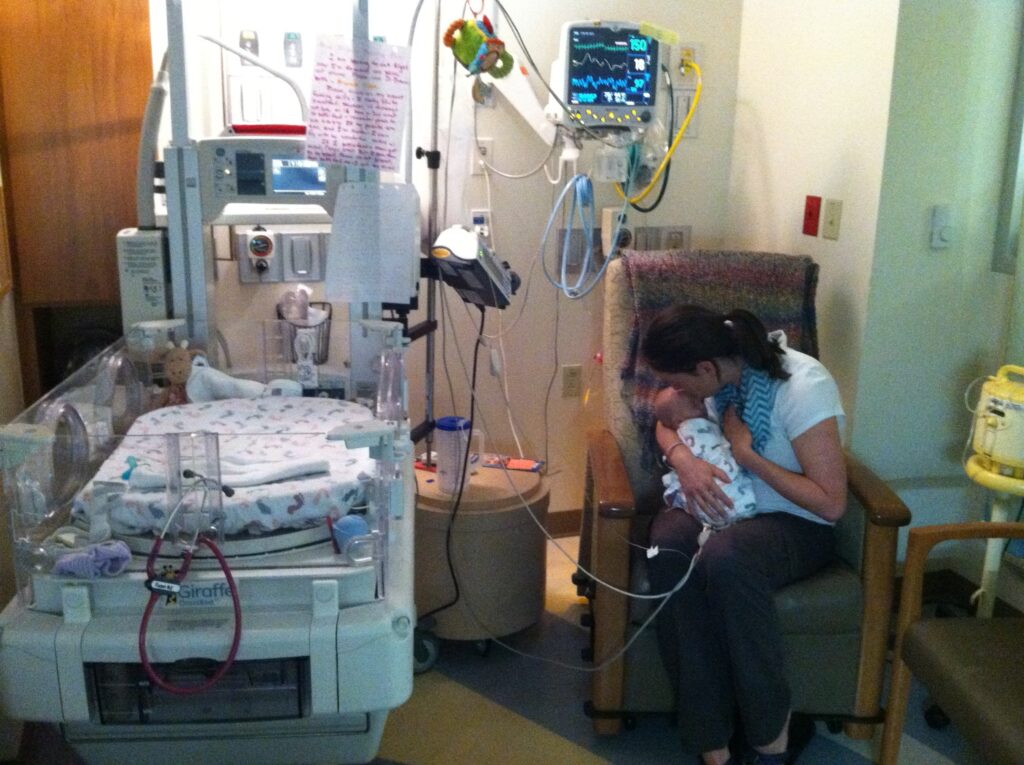This article was written by Julie Foge, a guest writer for the INCM Blog.
When my daughter Eliza landed unexpectedly in the NICU the day after she was born, I felt as though the floor had dropped out from underneath me. I was overwhelmed, crippled by fear and exhaustion. We had not planned for a five-week hospital stay, and we had not planned for the rare chromosomal diagnosis we received when we were there: Prader-Willi syndrome. Before her first birthday, Eliza was hospitalized seven times, undergoing two surgeries, and coming home from various stays with supplemental oxygen and a feeding tube.

That first year went by in a blur, but what remains clear to this day is the intense love we experienced, both from God and from all the people in our lives who acted as the very hands and feet of Jesus during that dark season.
I hope that sharing my story and offering three ways children’s ministries and church leaders can minister to and care for families in a medical crisis allows others to receive the same.
1. Organize practical help for the family and make it simple for them to receive it.
Decision fatigue is real, and those parents are exhausted in every sense of the word. While it sounds lovely to reach out and ask, “How can I help?” It is often overwhelming to know how to respond or even to know what they need. It is so much easier to respond to a simple yes or no question than to produce a list of your own. And while food is the go-to for simple reasons, we all need to eat and it is one less thing for them to manage, there are many other ways you can offer help as well.
Here are a few ideas:
- Is it winter? Create a rotation of people willing to shovel their sidewalk.
- Is there a sibling at home? Offer to host a playdate or drive the carpool.
- Is a holiday coming up? Buy or wrap presents for them.
- Is there a pet at home that needs to be let out or walked? Let them know when you can pick up a key and make it happen for them.
- Find more suggestions here.
Action steps: Organize a care or meal train calendar using any of the free online resources (www.mealtrain.com is a favorite we’ve used in the past). Start by asking if there are any allergies or food restrictions, such as a vegetarian in the house or someone with a lactose intolerance. Again, this is an easy yes or no for them. Then consider whether it will be eaten right away or reheated. If there are kids in the house, make sure you include things that they will eat too. Fresh fruits already washed, and cut are life savers. So are things like Lunchables® and cereal bars for on-the-go meals. Whenever possible, make sure you send food in containers that do not need to be returned.
2. Assume what the family wants is space and privacy, and honor that boundary.
This feels counter-intuitive, especially considering how important it is that families know they are not alone (which, in my opinion, is the most important thing for them to hear). But it should be up to the parents to say who and when they want to receive visitors or pick up the phone. The parents are likely being flooded with calls and messages asking for updates or wanting to know what can be done to help, and that is good and important, but it can also become an extra task that families may not have the bandwidth to navigate. Make sure you say that you do not need a response but are available and honored to pick up the phone or visit them in the hospital if that is where they are staying.
Action steps: Get a cooler and put it on their porch so that meal delivery does not require a weary parent to invite friends in or get dressed. Designate one point person and let the family know who that will be, if they have not already shared a preference, so that messages to everyone else can be easily shared without putting new burdens on the parents. You can even offer to hang a door sign relaying that information to visitors.
3. Check in regularly with encouraging messages, scripture, and prayers.
Parents may not be responding to your texts or calls, but they are certainly seeing them on their phones. Be intentional and consistent about reaching out and preface your messages by assuring them they do not need to respond. When we were in the NICU, one of our pastors asked if she could organize a prayer vigil at the hospital chapel. More than a dozen women showed up and sat beside me in a circle, crying out to God for help and healing. They brought a prayer shawl that I wore daily afterward, and one woman gifted me a stone in the shape of a heart to hold as a reminder that I too was held by a love greater than any fear. Those tangible treasures were precious, and the prayers and presence of those dear friends were a lifeline.
Action steps: Set a reminder on your phone or calendar to send a text or email at least three times a week. You do not have to produce long, personalized messages (although those can be great). It can be as simple as snapping a photo from your devotional or screenshotting what someone else has already created. My website is a great place to find prayers, quotes, and scriptures that you can easily send along, or head to Pinterest for an easy way to search for more.
Go the extra mile by sharing your prayers with them. It is beautiful to know someone is praying for you, but there is something so special about hearing that prayer, and if being in person to pray over them is not an option, text it to them. Use their names and call out to God. It can be simple and short.
Here is an example using my family’s name:
God, I lift up the Foge family to you this morning. I pray that you would make your presence known in that hospital room and that you would give clarity to their decisions and rest for their weary hearts and bodies. Father, I thank you for sweet Eliza and the love you have poured into her already. We know she is yours, and we trust you are holding her and her family in this challenging time. Please guide the doctors, nurses, and medical assistants to help her. Give them wisdom, Lord. We ask it all in your Son’s holy name. Amen.
Final Thoughts
When we find ourselves in crisis, we often recognize our utter need for God in ways we otherwise miss. It’s easy to believe in the illusion of control we want to project in our daily lives, but unexpected medical issues shatter that façade. And that’s a good thing if we allow it to be. Church leaders and members have the privilege of walking alongside families at their most vulnerable times. The ways we support them – through action, prayer, help, and encouragement – will be felt and experienced in depths that extend beyond the difficult season.

About Julie
Julie Foge is the proud mama of three incredible daughters: Amelia, Eliza, and Caroline. When Eliza was born in 2016, they landed first in the NICU and then in the special needs world when Eliza was diagnosed with a rare chromosomal condition called Prader-Willi syndrome (PWS), Life as Julie knew it changed forever. And so did she. Eliza’s struggles and her triumphs became Julie’s rallying cry, inviting her to fierce advocacy, meaningful connections, and awestruck wonder. Julie has served as a faculty member and conference presenter for the rare disease community and as a speaker and mentor at churches across the country, both through children’s ministry and as a MOPS mentor. She feels called to be a vessel of God’s grace and hope and has created a platform for her website, www.leaningintolove.com, she is nothing but grateful that she gets to do this work alongside her husband, Derrick, from their home in Anchorage, Alaska.






